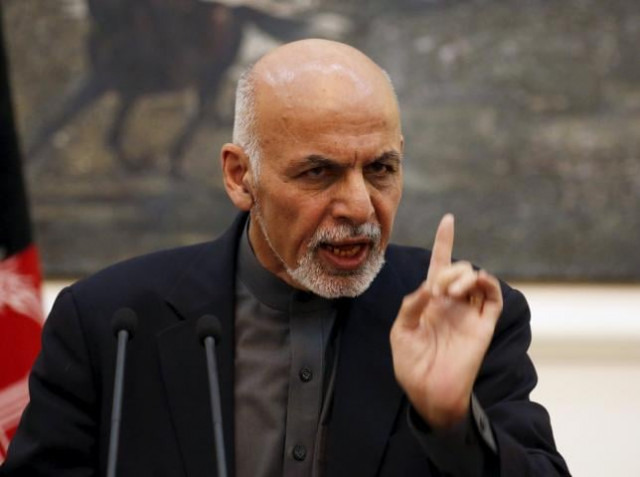Faltering peace process: Ghani renews talks offer to unamenable Taliban
‘Undeclared war between Pakistan and Afghanistan’ to blame for conflict

Afghan President Ashraf Ghani. PHOTO: REUTERS
Ghani’s reiteration of the talks offer came a day after the Afghan Taliban rejected what they called ‘futile, misleading negotiations’. The Afghan leader urged insurgent groups to come to the negotiating table during his speech to a post-winter break opening session of parliament on Sunday.

“As Pakistan has agreed to host the direct talks, it should extend invitations to all the groups,” Afghan diplomatic sources told The Express Tribune.
Sources in Hekmatyar’s HeI — the second largest resistance movement in Afghanistan — said the group had been contacted but no formal invitation was ever extended.
The much-anticipated peace negotiations could suffer another setback if the HeI is left out, especially after the Taliban have publicly refused to join the planned dialogue.
The third Quadrilateral Coordination Group (QCG) meeting in Kabul last month had welcomed Ghani’s invitation to Taliban groups and the HeI, and mentioned it in a joint statement issued after the session.
Afghan Foreign Minister Salahuddin Rabbani invited the HeI in his speech to the four-nation meeting on February 23, and later also spoke to the movement’s political affairs head Ghairat Baheer.
An HeI source said the group’s leaders had not never rejected dialogue during a series of discussions, but would participate only if formally invited. “The invitation might have been withheld in view of Taliban pressure.”
Since the fate of the talks is clouded in uncertainty, the Afghan president has opted for a conciliatory approach with the Taliban. “We urge the Taliban to join peace talks and determine as to what is the best way to serve Islam and Afghanistan,” Ghani told the lawmakers in Kabul.
A day earlier, the Taliban had discredited diplomatic efforts by Pakistan, Afghanistan, China and the United States, and said their political office in Qatar had been kept in the dark on the four-nation peace initiative.

“We want peace, and no one should doubt our intensions,” Ghani said. “That has been our national approach. There is consensus about reconciliation and peace [in Afghanistan]. We have a strong resolve for peace. We have not given up this policy even though the environment has been sensitive and fighting is under way.”
The Taliban’s rejection of the peace talks has put the member countries of the QCG in a difficult position, as the quartet had agreed to take action against ‘irreconcilable’ elements. Another quadrilateral meeting is expected to be held to review the situation emerging because of the Taliban’s refusal to participate in the dialogue amid serious concerns in Afghanistan regarding possible intensification in fighting as the weather warms up.
President Ghani opposed secrecy in the peace process, saying the Afghan nation should be informed about the process. “Peace cannot be achieved through secret efforts. We must keep the people informed.”
Addressing the Taliban, he said: “I want to tell the Taliban they are faced with a testing time, and they should now decide whether they stand with the nation or with the enemies of Afghanistan.”
Ghani listed the factors behind the continued conflict in his country, saying the war was not internal but was, instead, imposed upon the Afghans. Terming al Qaeda the main element of the war, he also mentioned the Islamic State, militants from Uzbekistan, Tajikistan, Chechnya and Xinjiang, Pakistani and Afghan Taliban, and the ‘undeclared war between Pakistan and Afghanistan’.
The president pleaded for better relations with Pakistan. “The common reason for peace between Pakistan and Afghanistan is that we both are burning in the fire of terrorism. We both want the other to respect our sovereignty.”
Published in The Express Tribune, March 7th, 2016.



















COMMENTS
Comments are moderated and generally will be posted if they are on-topic and not abusive.
For more information, please see our Comments FAQ